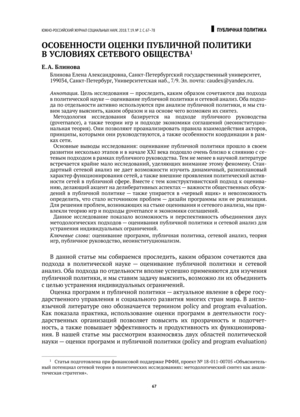Abstract
The purpose of the paper is to examine how two approaches — public policy evaluation and network analysis are combined. Both approaches are separately used in the analysis of public policy, and we set ourselves to find out how and on what basis their synthesis is possible. Methodology: our research is based on the approach of public governance, as well as game theory and the economics of agreements (neo-institutional theory). They help to analyze the rules of interaction between actors, the principles they are guided by, and also the features of coordination within the network. Conclusions: public policy evaluation has passed several stages in its development, and in the early 21st century came close to the merger with the network approach within the framework of governance approach. Nevertheless, there are very few studies in scientific literature that pay attention to this phenomenon. Standard network analysis does not provide the opportunity to study the dynamic, diverse nature of the functioning of networks, or the external effects of political activity of networks in the public sphere. At the same time, the constructivist approach to evaluation, which emphasizes the deliberation aspects — the importance of public discussions in public policy — also fails to determine what caused the problems — the design of the program or its implementation. To solve problems arising at the junction of evaluation and network analysis, we have used game theory, governance approach and economics of agreements. Scientific significance: this research has shown the possibility and the prospects of combining two methodological approaches — public policy evaluation and network analysis — to eliminate individual limitations.
Keywords
Funding information
The study was carried out through the financial support of the Russian Fund of Fundamental Research (RFFR), as part of the scientific project № 18–011–00705 “The Explanatory Potential of Network Theory in Political Research: Methodological Synthesis as Analytical Strategy”.
References
Олейник, А.Н. (2000). Институциональная экономика. Учебное пособие. М.: Инфра-М.
Сморгунов, Л.В. (2012). В поисках управляемости: концепции и трансформации государственного управления в XXI веке. СПб.: Изд-во С.-Петерб. ун-та.
Тевено, Л. (1997). Множественность способов координации: равновесие и рациональность в сложном мире. Вопросы экономики, 10, 44–56.
Тевено, Л. (2001). Рациональность или социальные нормы: преодоленное противоречие?. Экономическая социология (электронный журнал), 2, № 1. Режим доступа www.ecsoc.msses.ru
Эмар-Дюверне, Ф. (1997). Конвенции качества и множественность форм координации. Вопросы экономики, 10, 71–82.
Albrecht, M., Elbe, J., Elbe, S. & Meyer, W. (2014). Analyzing and evaluating regional governance networks: Three challenges for applications. Evaluation, 20 (1), 58–74.
Bannink, D. & Ossewaarde, R. (2012). Decentralization: New Modes of Governance and Administrative Responsibility. Administration & Society, 44, 595–625.
Börzel, T.A. (1997). What’s So Special About Policy Networks? — An Exploration of the Concept and Its Usefulness in Studying European Governance. European Integration online Papers, 1, (16), 1–24.
Carlsson, L. (2000). Non-hierarchical evaluation of policy. Evaluation, 6 (2), 201–216.
Guba, E.G. & Lincoln, Y.S. (1989). Fourth Generation Evaluation. Newbury Park, CA: SAGE.
Hansen, M. & Vedung, E. (2010). Theory-based stakeholder evaluation. American Journal of Evaluation, 31 (3), 295–313.
Haynes, P. (2008). Complexity theory and evaluation in public management. Public Management Review, 10 (3), 401–419.
Hermans, L., Cunningham, S. & Slinger, J. (2014). The usefulness of game theory as a method for policy evaluation. Evaluation, 20 (1), 10–25.
Hertting, N. & Vedung, E. (2012). Purposes and criteria in network governance evaluation: How far does standard evaluation vocabulary takes us?, Evaluation, 18 (1), 27–46.
House, E.R. & Howe, R.H. (1999). Values in evaluation and social research. Thousand Oaks, CA: SAGE.
Papadopolus, Y. (2003). Cooperative forms of governance: problems of democratic accountability in complex environments. European Journal of Political Research, 42 (4), 473–501.
Patton, M. (1997). Utilization-focused evaluation: the new century text / by Michael Quinn Patton. 3rd edition. Newbury Park, CA: Sage Publications Inc.
Pollitt, С. (1999). Stunted by Stakeholders? Limits to Collaborative Evaluation. Public Policy and Administration, 14 (2), 77–90.
Provan, K. & Kenis, P. (2007). Modes of network governance: structure, management, and effectiveness. Journal of Public Administration & Theory, 18 (2), 229–252.
Rossi, P.H., Lipsey M.W. & Freeman H.E. (2004). Evaluation: a systematic approach. 7th Edition. Newbury Park, CA: Sage Publications, Inc.
Schelling, T. (2010). Game theory: a practitioner’s approach. Economics and Philosophy, 26 (1), 27–46.
Scriven, M. (1996). The theory behind practical evaluation. Evaluation, 2 (4), 393–404.
Meer, Van der, F. & Edelenbos, J. (2006). Evaluation in multi-actor policy processes: accountability, learning and co-operation. Evaluation, 12 (2), 201–218.
Van Kersbergen, K., & Van Waarden, F. (2004). “Governance” as a bridge between disciplines: Cross-disciplinary inspiration regarding shifts in governance and problems of governability, accountability and legitimacy. European Journal of Political Research, 43, 143–171.
Wollmann, H. (2003). Evaluation in public-sector reform: Toward a ‘third wave’ of evaluation? In: Hellmut Wollmann (ed.), Evaluation in Public Sector Reform. Cheltenham/Northampton: Edgar Elgar.

